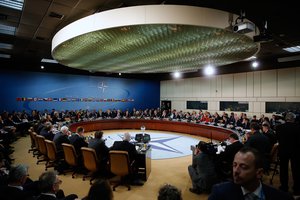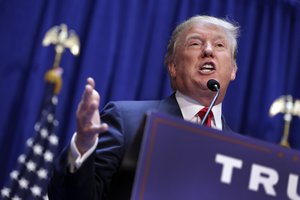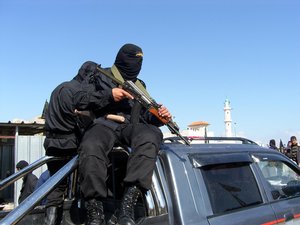- published: 12 Apr 2009
- views: 44165
-
remove the playlistGreat Leap Forward
- remove the playlistGreat Leap Forward
- published: 16 Apr 2013
- views: 110434
- published: 02 Jul 2012
- views: 30952
- published: 29 Dec 2013
- views: 44587

The Great Leap Forward (simplified Chinese: 大跃进; traditional Chinese: 大躍進; pinyin: Dà yuè jìn) of the People's Republic of China (PRC) was an economic and social campaign of the Communist Party of China (CPC), reflected in planning decisions from 1958 to 1961, which aimed to use China's vast population to rapidly transform the country from an agrarian economy into a modern communist society through the process of rapid industrialization and collectivization. Mao Zedong led the campaign based on the Theory of Productive Forces, and intensified it after being informed of the impending disaster from grain shortages.
Chief changes in the lives of rural Chinese included the introduction of a mandatory process of agricultural collectivization, which was introduced incrementally. Private farming was prohibited, and those engaged in it were labeled as counter revolutionaries and persecuted. Restrictions on rural people were enforced through public struggle sessions, and social pressure, although people also experienced forced labor. Rural industrialization, officially a priority of the campaign, saw "its development … aborted by the mistakes of the Great Leap Forward."
This article is licensed under the Creative Commons Attribution-ShareAlike 3.0 Unported License, which means that you can copy and modify it as long as the entire work (including additions) remains under this license.

Mao Zedong, also transliterated as Mao Tse-tung ![]() listen (help·info), and commonly referred to as Chairman Mao (December 26, 1893 – September 9, 1976), was a Chinese Communist revolutionary, guerrilla warfare strategist, Marxist political philosopher, and leader of the Chinese Revolution. He was the architect and founding father of the People's Republic of China (PRC) from its establishment in 1949, and held authoritarian control over the nation until his death in 1976. His theoretical contribution to Marxism–Leninism, along with his military strategies and brand of policies, are collectively known as Maoism.
listen (help·info), and commonly referred to as Chairman Mao (December 26, 1893 – September 9, 1976), was a Chinese Communist revolutionary, guerrilla warfare strategist, Marxist political philosopher, and leader of the Chinese Revolution. He was the architect and founding father of the People's Republic of China (PRC) from its establishment in 1949, and held authoritarian control over the nation until his death in 1976. His theoretical contribution to Marxism–Leninism, along with his military strategies and brand of policies, are collectively known as Maoism.
Mao rose to power by commanding the Long March, forming a Second United Front with Kuomintang (KMT) during the Second Sino-Japanese War to repel a Japanese invasion, and leading the Communist Party of China (CPC) to victory against Generalissimo Chiang Kai-shek's Kuomintang (KMT) in the Chinese Civil War. After solidifying the reunification of China through his Campaign to Suppress Counterrevolutionaries, Mao enacted sweeping land reform, by using violence and terror to overthrow the feudal landlords before seizing their large estates and dividing the land into people's communes. During the years when Mao was China’s 'Great Helmsman', a range of positive changes came to China. These included promoting the status of women, improving popular literacy, doubling the school population, providing universal housing, abolishing unemployment and inflation, increasing health care access, and dramatically raising life expectancy. In addition, China's population almost doubled during the period of Mao's leadership (from around 550 to over 900 million). As a result, Mao is still officially held in high regard by many in China as a great political strategist, military mastermind, and savior of the nation. Maoists further promote his role as a theorist, statesman, poet, and visionary, while anti-revisionists continue to defend most of his policies.
This article is licensed under the Creative Commons Attribution-ShareAlike 3.0 Unported License, which means that you can copy and modify it as long as the entire work (including additions) remains under this license.
- Loading...

-
 6:05
6:05Great Leap Forward Summary
Great Leap Forward SummaryGreat Leap Forward Summary
-
 52:27
52:27Mao's Great Famine HDTV great leap foward, history of china
Mao's Great Famine HDTV great leap foward, history of china -
 4:33
4:33Billy Bragg's "Great Leap Forward"
Billy Bragg's "Great Leap Forward"Billy Bragg's "Great Leap Forward"
-
 12:57
12:57China under Mao - Great Leap Forward
China under Mao - Great Leap ForwardChina under Mao - Great Leap Forward
-
 4:59
4:59Billy Bragg - Waiting For The Great Leap Forward (Live on KEXP)
Billy Bragg - Waiting For The Great Leap Forward (Live on KEXP)Billy Bragg - Waiting For The Great Leap Forward (Live on KEXP)
http://KEXP.ORG presents Billy Bragg performing "Waiting For The Great Leap Forward" live in the KEXP studio. Recorded 3/14/2013. Host: Troy Nelson Audio Engineer: Kevin Suggs Cameras: Jim Beckmann, Shelly Corbett & Scott Holpainen Editor: Scott Holpainen http://www.billybragg.co.uk http://kexp.org http://mellowjohnnys.com -
 4:36
4:36Billy Bragg - Waiting For The Great Leap Forward
Billy Bragg - Waiting For The Great Leap ForwardBilly Bragg - Waiting For The Great Leap Forward
From: Workers Playtime -
 4:06
4:06Billy Bragg - Waiting For The Great Leap Forward.
Billy Bragg - Waiting For The Great Leap Forward.Billy Bragg - Waiting For The Great Leap Forward.
It may have been Camelot for Jack and Jacqueline But on the Che Guevara highway filling up with gasoline Fidel Castro's brother spies a rich lady who's crying Over luxury's disappointment So he walks over and he's trying To sympathize with her but thinks that he should warn her That the Third World is just around the corner In the Soviet Union a scientist is blinded By the resumption of nuclear testing and he is reminded That Dr Robert Oppenheimer's optimism fell At the first hurdle In the Cheese Pavilion and the only noise I hear Is the sound of people stacking chairs And mopping up spilt beer And someone asking questions and basking in the light Of the fifteen fame filled minutes of the fanzine writer Mixing Pop and Politics he asks me what the use is I offer him embarrassment and my usual excuses While looking down the corridor Out to where the van is waiting I'm looking for the Great Leap Forwards Jumble sales are organized and pamphlets have been posted Even after closing time there's still parties to be hosted You can be active with the activists Or sleep in with the sleepers While you're waiting for the Great Leap Forwards One leap forwards, two leaps back Will politics get me the sack? Here comes the future and you can't run from it If you've got a blacklist I want to be on it It's a mighty long way down rock 'n roll From Top of the Pops to drawing the dole If no one seems to understands Start your own revolution, cut out the middleman In a perfect world we'd all sing in tune But this is reality so give me some room So join the struggle while you may The Revolution is just a t-shirt away -
 4:08
4:08Billy Bragg Waiting for the Great Leap Forwards 2011 Lyrics
Billy Bragg Waiting for the Great Leap Forwards 2011 LyricsBilly Bragg Waiting for the Great Leap Forwards 2011 Lyrics
Live at Keele University Union 20th November 2011 -
 49:13
49:13China's Great Leap Forward | 1958 | History of China Under Mao Zedong | CIA Documentary Film
China's Great Leap Forward | 1958 | History of China Under Mao Zedong | CIA Documentary FilmChina's Great Leap Forward | 1958 | History of China Under Mao Zedong | CIA Documentary Film
►My channel: http://youtube.com/TheBestFilmArchives ►SUBSCRIBE: http://www.youtube.com/TheBestFilmArchives?sub_confirmation=1 ►Google+: http://plus.google.com/+TheBestFilmArchives ►Facebook: http://facebook.com/TheBestFilmArchives This film is a documentary on the first year (1958) of the Chinese economic and social campaign, named the Great Leap Forward. The campaign was led by Mao Zedong and aimed to rapidly transform the country into an industrialized communist society. China's Great Leap Forward | 1958 | History of China Under Mao Zedong | CIA Documentary Film -
 2:27
2:27Mao Zedong- Great Leap Forward
Mao Zedong- Great Leap ForwardMao Zedong- Great Leap Forward
-
 52:46
52:464_6 Communism - The Promise and the Reality - Great Leap Forward
4_6 Communism - The Promise and the Reality - Great Leap Forward4_6 Communism - The Promise and the Reality - Great Leap Forward
Communism - The Promise and the Reality Great Leap Forward -
 4:41
4:41Billy Bragg - Waiting For The Great Leap Forwards
Billy Bragg - Waiting For The Great Leap ForwardsBilly Bragg - Waiting For The Great Leap Forwards
From The Henry Rollins Show, 5/25/07 -
 53:51
53:51People's Century Part 15 1949 Great leap
People's Century Part 15 1949 Great leapPeople's Century Part 15 1949 Great leap
I do not own rights to this video and do not intend to infringe upon them for personal gain. I am posting this series for educational purposes only. This is a PBS/BBC documentary series produced in the 90's that I believe should be available to the public but unfortunately it is not as of the posting of this video. This series was originally transmitted for free on public airwaves funded by tax dollars/pounds and I believe it is fair it remains available. All credits for music and content are provided in the ending credits. -
 4:37
4:37Billy Bragg - Waiting For The Great Leap Forward - 3/15/2013 - Stage On Sixth
Billy Bragg - Waiting For The Great Leap Forward - 3/15/2013 - Stage On SixthBilly Bragg - Waiting For The Great Leap Forward - 3/15/2013 - Stage On Sixth
Billy Bragg - Waiting For The Great Leap Forward Recorded Live: 3/15/2013 - Stage On Sixth (Austin,TX) Subscribe to Paste on YouTube: http://goo.gl/AU2nKB Visit Paste Magazine: http://www.pastemagazine.com
- 20th Party Congress
- 61889 Regiment
- Agrarian
- Agriculture in China
- Anhui
- Anne Applebaum
- Asia Society
- Australia
- Backyard furnace
- Big-character poster
- Bohai Economic Rim
- Bourgeoisie
- Bruce McFarlane
- Canada
- Cannibalism
- Cao Wei
- Capitalist roader
- Chen Boda
- Chen Yi (communist)
- Child marriage
- Chinese beer
- Chinese correction
- Chinese currency
- Chinese emigration
- Chinese shipping
- Chinese yuan
- Cinema of China
- CITIC
- Class struggle
- Collective
- Collectivization
- Communism
- Communist
- Corvée
- Crime of apartheid
- Cult of personality
- Cultural Revolution
- Dalian Software Park
- Daoxian
- Death rate
- Democide
- Democracy Wall
- Democratic Kampuchea
- Deng Xiaoping
- Doggerel
- East Germany
- Eastern Han
- Eastern Jin Dynasty
- Eastern Wu
- Eastern Zhou
- Economic science
- Economy of East Asia
- Emaciation
- Expo 2010
- Feudal Fascism
- Feudalism
- Foot-binding
- Four Modernizations
- Four Olds
- Frank Dikötter
- Fujian
- Fuyang, Anhui
- Gang of Four
- Gansu
- Genocide
- Go Out policy
- Gold mining in China
- Great Chinese Famine
- Great Irish Famine
- Great Leap Forward
- Guangdong
- Han Dynasty
- Hefei
- Henan
- History of Beijing
- History of China
- History of Hong Kong
- History of Macau
- History of Shanghai
- Honan
- Hong Kong
- Hu Jintao
- Hukou system
- Hungary
- Hunger
- Impoverished
- Industrialization
- Iron rice bowl
- Irrigation
- January Storm
- Jasper Becker
- Jiang Qing
- Jiang Zemin
- Joan Robinson
- John F Kennedy
- Jon Halliday
- Joseph Stalin
- Jung Chang
- Kang Sheng
- Killing Fields
- Knopf
- Korean War
- Kuomintang
- Labor camp
- Li Zhisui
- Liao Dynasty
- Lin Biao
- List of famines
- List of GB standards
- Liu Shaoqi
- Locust
- Long March
- Lushan Conference
- Made in China
- Manchuria
- Mao Yuanxin
- Mao Zedong
- Maoism
- Maoist
- Mark Selden
- Meredith Jung-En Woo
- Metallurgy
- Ming Dynasty
- Monthly Review
- Monthly Review Press
- Nanjing
- New York Times
- Nikita Khrushchev
- Northern Song
- Oil shale in China
- One Divides Into Two
- Opium
- Outline of China
- Palgrave MacMillan
- Peaceful coexistence
- Peng Dehuai
- Peng Zhen
- People's commune
- Pharmacy in China
- Philip Short
- Pig iron
- Pinyin
- Pluto Press
- Poland
- Politburo
- Portal China
- Portal History
- Ports of China
- Private property
- Project 571 Outline
- Proletariat
- Propaganda
- Public domain
- Qin Dynasty
- Qing Dynasty
- Qinghai
- Renminbi
- Revolutionary opera
- Rice
- Routledge
- Rudolph Rummel
- SASAC
- Scar literature
- Self-criticism
- Shandong
- Shang Dynasty
- Shanxi
- Shimen
- Shu Han
- Sichuan
- Sino-Soviet Split
- Sino-Vietnamese War
- Sixteen Kingdoms
- Socialist state
- Song Dynasty
- Southern Song
- Soviet Union
- SSE Composite
- Steel
- Steven Rosefielde
- Struggle session
- Sui Dynasty
- Taiping Rebellion
- Tang Dynasty
- The Financial Times
- The Hongs
- The New York Times
- The Washington Post
- Third Period
- Three Kingdoms
- Tiananmen Incident
- Tibetans
- Trofim Lysenko
- Two Whatevers
- United Kingdom
- USSR
- Vintage Books
- Wang Dongxing
- Wang Hongwen
- Welfare state
- Western Han
- Western Jin Dynasty
- Western Xia
- Western Zhou
- Wikipedia Link rot
- William H. Hinton
- Wine in China
- World War II
- Wu Han (PRC)
- Wu Zetian
- Wuhan Incident
- Xia Dynasty
- Xie Fuzhi
- Xin Dynasty
- Xinhua
- Xinyang
- Yan'an
- Yang Jisheng
- Yao Wenyuan
- Yellow River
- Youth Business China
- Yuan Dynasty
- Yunnan
- Zhang Chunqiao
- Zhou Dynasty
- Zhou Enlai
Great Leap Forward
ALBUMS
- Cinkofa released: 2001
Cinkofa
Released 2001- add to main playlist Play in Full Screen White Whales
- add to main playlist Play in Full Screen Techsnow
- add to main playlist Play in Full Screen Old Money
- add to main playlist Play in Full Screen Morning Child
- add to main playlist Play in Full Screen Bulb
- add to main playlist Play in Full Screen Sparta
- add to main playlist Play in Full Screen Sun Patterns
- add to main playlist Play in Full Screen Kremlin Boogie
- add to main playlist Play in Full Screen High Altitude
-

Great Leap Forward Summary
-

-

Billy Bragg's "Great Leap Forward"
-

China under Mao - Great Leap Forward
-

Billy Bragg - Waiting For The Great Leap Forward (Live on KEXP)
http://KEXP.ORG presents Billy Bragg performing "Waiting For The Great Leap Forward" live in the KEXP studio. Recorded 3/14/2013. Host: Troy Nelson Audio Engineer: Kevin Suggs Cameras: Jim Beckmann, Shelly Corbett & Scott Holpainen Editor: Scott Holpainen http://www.billybragg.co.uk http://kexp.org http://mellowjohnnys.com -

Billy Bragg - Waiting For The Great Leap Forward
From: Workers Playtime -

Billy Bragg - Waiting For The Great Leap Forward.
It may have been Camelot for Jack and Jacqueline But on the Che Guevara highway filling up with gasoline Fidel Castro's brother spies a rich lady who's crying Over luxury's disappointment So he walks over and he's trying To sympathize with her but thinks that he should warn her That the Third World is just around the corner In the Soviet Union a scientist is blinded By the resumption of nuclear testing and he is reminded That Dr Robert Oppenheimer's optimism fell At the first hurdle In the Cheese Pavilion and the only noise I hear Is the sound of people stacking chairs And mopping up spilt beer And someone asking questions and basking in the light Of the fifteen fame filled minutes of the fanzine writer Mixing Pop and Politics he asks me what the use is I offer him embarrassment and my usu... -

Billy Bragg Waiting for the Great Leap Forwards 2011 Lyrics
Live at Keele University Union 20th November 2011 -

China's Great Leap Forward | 1958 | History of China Under Mao Zedong | CIA Documentary Film
►My channel: http://youtube.com/TheBestFilmArchives ►SUBSCRIBE: http://www.youtube.com/TheBestFilmArchives?sub_confirmation=1 ►Google+: http://plus.google.com/+TheBestFilmArchives ►Facebook: http://facebook.com/TheBestFilmArchives This film is a documentary on the first year (1958) of the Chinese economic and social campaign, named the Great Leap Forward. The campaign was led by Mao Zedong and aimed to rapidly transform the country into an industrialized communist society. China's Great Leap Forward | 1958 | History of China Under Mao Zedong | CIA Documentary Film -

Mao Zedong- Great Leap Forward
-

4_6 Communism - The Promise and the Reality - Great Leap Forward
Communism - The Promise and the Reality Great Leap Forward -

Billy Bragg - Waiting For The Great Leap Forwards
From The Henry Rollins Show, 5/25/07 -

People's Century Part 15 1949 Great leap
I do not own rights to this video and do not intend to infringe upon them for personal gain. I am posting this series for educational purposes only. This is a PBS/BBC documentary series produced in the 90's that I believe should be available to the public but unfortunately it is not as of the posting of this video. This series was originally transmitted for free on public airwaves funded by tax dollars/pounds and I believe it is fair it remains available. All credits for music and content are provided in the ending credits. -

Billy Bragg - Waiting For The Great Leap Forward - 3/15/2013 - Stage On Sixth
Billy Bragg - Waiting For The Great Leap Forward Recorded Live: 3/15/2013 - Stage On Sixth (Austin,TX) Subscribe to Paste on YouTube: http://goo.gl/AU2nKB Visit Paste Magazine: http://www.pastemagazine.com -

Black Ops II - Zombies - Die Rise - Great Leap Forward
Welcome to Buchanan Games where today i i show you one of my best games in call of duty black ops 2's zombies! I hope you enjoyed, please like this video to show your support, your like means a lot, it would really be appreciated if you could also leave a comment with your thoughts, also favourite the video, share to Facebook and Twitter and Subscribe for much more Please look at some other channels of ours like: http://www.youtube.com/MrHaydnBuchanan http://www.youtube.com/BuchananFilms if you get the chance, also check out this channel for some of the best FPS gameplay i have ever seen: http://www.youtube.com/imCravin -

Billy Bragg performs "Waiting for the Great Leap Forwards"
Billy Bragg performs "Waiting For The Great Leap Forwards" and also gives an interview on Dave's show in 1988. -

Did Mao Really Kill Millions in the Great Leap Forward?
A thorough debunking of the phony claim that Mao killed millions with a great famine. From the Leading Light Communist Organization. http://monthlyreview.org/commentary/did-mao-really-kill-millions-in-the-great-leap-forward -

The 4400 Season 4 Episode 13 The Great Leap Forward Director's Cut
S4, Ep13 16 Sep. 2007 The Great Leap Forward Danny Farrell's newfound ability to spread promicin leads to several hundred deaths, including his mother. With Seattle in chaos, NTAC is forced to accept Promise City's offer of help. -

ZOMBIE TIPS : Die Rise - Best Starting Rounds Strategy (Great Leap Forward) Black Ops 2 Zombies
This is a quick tip tutorial on the best and easiest way to get fully setup with all the perks, guns and other items that you will acquire to get to them high rounds. This can be used on solo or multiplayer with friends. Thanks for watching, please leave a rating, a comment and most importantly subscribe. Other Tip Videos on Die Rise: -ZOMBIE TIPS : Die Rise - Best Starting Rounds Strategy (Great Leap Forward) Other Die Rise Videos: -DIE RISE : How To Get 5+ Perks http://www.youtube.com/watch?v=rEh5-l82JHg -DIE RISE : New Weapon - How To Get AN-94 http://www.youtube.com/watch?v=xN3rpZxZ0sA -DIE RISE : New Weapon - How To Get PDW-57 http://www.youtube.com/watch?v=AHdLErLQn50 -DIE RISE : New Weapon - How To Turn On Music http://www.youtube.com/watch?v=8S7GHzqHiWs -DIE RISE : How To M... -

Red Sparowes - The great leap forward
please support featured artist -

-

Simple Minds - Great Leap Forward lyrics
Great Leap Forward Simple Minds Album Good News From The Next World I don't own this song or the lyrics. Man, this was a hard one to make! ;) -

Black Ops 2 Zombies - Die Rise (Great Leap Forward) First Gameplay
This is Ryo, frustrated with Pinnacle Studio, but happy with the new Zombies map, Die Rise. So, I tried rendering this about five different times, and each time it messed up the audio. So, here is the raw file. No real big difference except that it's a bit long and it as no cuts. It also doesn't have the intro or credits, but I don't think you guys will mind. Expect some more videos after I resolve my technical problems....
Great Leap Forward Summary
- Order: Reorder
- Duration: 6:05
- Updated: 12 Apr 2009
- views: 44165
- published: 12 Apr 2009
- views: 44165
Mao's Great Famine HDTV great leap foward, history of china
- Order: Reorder
- Duration: 52:27
- Updated: 20 Jan 2013
- views: 283319
Billy Bragg's "Great Leap Forward"
- Order: Reorder
- Duration: 4:33
- Updated: 07 Oct 2011
- views: 164301
- published: 07 Oct 2011
- views: 164301
China under Mao - Great Leap Forward
- Order: Reorder
- Duration: 12:57
- Updated: 21 Jan 2013
- views: 16349
- published: 21 Jan 2013
- views: 16349
Billy Bragg - Waiting For The Great Leap Forward (Live on KEXP)
- Order: Reorder
- Duration: 4:59
- Updated: 16 Apr 2013
- views: 110434
- published: 16 Apr 2013
- views: 110434
Billy Bragg - Waiting For The Great Leap Forward
- Order: Reorder
- Duration: 4:36
- Updated: 26 Dec 2008
- views: 137767
Billy Bragg - Waiting For The Great Leap Forward.
- Order: Reorder
- Duration: 4:06
- Updated: 02 Jul 2012
- views: 30952
- published: 02 Jul 2012
- views: 30952
Billy Bragg Waiting for the Great Leap Forwards 2011 Lyrics
- Order: Reorder
- Duration: 4:08
- Updated: 23 Nov 2011
- views: 35936
China's Great Leap Forward | 1958 | History of China Under Mao Zedong | CIA Documentary Film
- Order: Reorder
- Duration: 49:13
- Updated: 29 Dec 2013
- views: 44587
- published: 29 Dec 2013
- views: 44587
Mao Zedong- Great Leap Forward
- Order: Reorder
- Duration: 2:27
- Updated: 18 Apr 2013
- views: 11309
- published: 18 Apr 2013
- views: 11309
4_6 Communism - The Promise and the Reality - Great Leap Forward
- Order: Reorder
- Duration: 52:46
- Updated: 09 Dec 2011
- views: 24381
Billy Bragg - Waiting For The Great Leap Forwards
- Order: Reorder
- Duration: 4:41
- Updated: 31 May 2007
- views: 646116
People's Century Part 15 1949 Great leap
- Order: Reorder
- Duration: 53:51
- Updated: 15 Dec 2013
- views: 22678
- published: 15 Dec 2013
- views: 22678
Billy Bragg - Waiting For The Great Leap Forward - 3/15/2013 - Stage On Sixth
- Order: Reorder
- Duration: 4:37
- Updated: 07 Jul 2014
- views: 1577
- published: 07 Jul 2014
- views: 1577
Black Ops II - Zombies - Die Rise - Great Leap Forward
- Order: Reorder
- Duration: 64:45
- Updated: 10 Nov 2013
- views: 2956
- published: 10 Nov 2013
- views: 2956
Billy Bragg performs "Waiting for the Great Leap Forwards"
- Order: Reorder
- Duration: 6:16
- Updated: 19 Jan 2013
- views: 49284
- published: 19 Jan 2013
- views: 49284
Did Mao Really Kill Millions in the Great Leap Forward?
- Order: Reorder
- Duration: 66:57
- Updated: 29 Oct 2011
- views: 33718
- published: 29 Oct 2011
- views: 33718
The 4400 Season 4 Episode 13 The Great Leap Forward Director's Cut
- Order: Reorder
- Duration: 38:58
- Updated: 13 Jul 2015
- views: 387
- published: 13 Jul 2015
- views: 387
ZOMBIE TIPS : Die Rise - Best Starting Rounds Strategy (Great Leap Forward) Black Ops 2 Zombies
- Order: Reorder
- Duration: 5:10
- Updated: 30 Jan 2013
- views: 46893
- published: 30 Jan 2013
- views: 46893
Red Sparowes - The great leap forward
- Order: Reorder
- Duration: 8:21
- Updated: 28 Oct 2008
- views: 7512
- published: 28 Oct 2008
- views: 7512
Great Leap Forward - Steer
- Order: Reorder
- Duration: 7:23
- Updated: 28 Jan 2009
- views: 3680
Simple Minds - Great Leap Forward lyrics
- Order: Reorder
- Duration: 5:39
- Updated: 21 May 2011
- views: 3071
- published: 21 May 2011
- views: 3071
Black Ops 2 Zombies - Die Rise (Great Leap Forward) First Gameplay
- Order: Reorder
- Duration: 31:03
- Updated: 30 Jan 2013
- views: 8875
- published: 30 Jan 2013
- views: 8875
- Playlist
- Chat
- Playlist
- Chat

Great Leap Forward Summary
- Report rights infringement
- published: 12 Apr 2009
- views: 44165

Mao's Great Famine HDTV great leap foward, history of china
- Report rights infringement
- published: 20 Jan 2013
- views: 283319

Billy Bragg's "Great Leap Forward"
- Report rights infringement
- published: 07 Oct 2011
- views: 164301

China under Mao - Great Leap Forward
- Report rights infringement
- published: 21 Jan 2013
- views: 16349

Billy Bragg - Waiting For The Great Leap Forward (Live on KEXP)
- Report rights infringement
- published: 16 Apr 2013
- views: 110434

Billy Bragg - Waiting For The Great Leap Forward
- Report rights infringement
- published: 26 Dec 2008
- views: 137767

Billy Bragg - Waiting For The Great Leap Forward.
- Report rights infringement
- published: 02 Jul 2012
- views: 30952

Billy Bragg Waiting for the Great Leap Forwards 2011 Lyrics
- Report rights infringement
- published: 23 Nov 2011
- views: 35936

China's Great Leap Forward | 1958 | History of China Under Mao Zedong | CIA Documentary Film
- Report rights infringement
- published: 29 Dec 2013
- views: 44587

Mao Zedong- Great Leap Forward
- Report rights infringement
- published: 18 Apr 2013
- views: 11309

4_6 Communism - The Promise and the Reality - Great Leap Forward
- Report rights infringement
- published: 09 Dec 2011
- views: 24381

Billy Bragg - Waiting For The Great Leap Forwards
- Report rights infringement
- published: 31 May 2007
- views: 646116

People's Century Part 15 1949 Great leap
- Report rights infringement
- published: 15 Dec 2013
- views: 22678

Billy Bragg - Waiting For The Great Leap Forward - 3/15/2013 - Stage On Sixth
- Report rights infringement
- published: 07 Jul 2014
- views: 1577
-
Lyrics list:text lyricsplay full screenplay karaoke
Brussels Attack Symbolizes More Blowback And Botched Responses
Edit WorldNews.com 24 Mar 2016Rise of Donald Trump is 'scary', says France's Nicolas Sarkozy
Edit The Times of India 24 Mar 2016
Have Norwegian Scientists Solved The Mystery Behind The Bermuda Triangle?
Edit WorldNews.com 23 Mar 2016Cynthia Lee Fontaine on her "Drag Race" elimination and battle with cancer
Edit The Examiner 22 Mar 2016how a socialist magazine is winning the left's war of ideas
Edit Vox 21 Mar 2016Deceptive figures irk Chinese public
Edit Taipei Times 20 Mar 2016Chinese governor's false claims highlight rampant deception
Edit The Oklahoman 20 Mar 2016Chinese governor's false claims shows practice of deception
Edit Yahoo Daily News 20 Mar 2016A man who seems to stand for so much, maybe best explained by his sixes
Edit The National 20 Mar 2016Weekend dossier: West Ham poised to leap into elite of English game
Edit The Independent 19 Mar 2016A man who seems to stand for so much, perhaps best explained by his sixes
Edit The National 19 Mar 2016Thursday’s best TV: Jo Brand’s Hell of a Walk for Sport Relief; Murder; Bear Grylls: Mission Survive
Edit The Guardian 17 Mar 2016Budget bashing gives George Osborne a shrinking feeling
Edit The Guardian 17 Mar 2016Are America's Best Days Over?
Edit Huffington Post 17 Mar 2016The Trillion Dollar Question
Edit Huffington Post 17 Mar 2016China’s Unsettled History, Viewed Through the Lens of Art and Literature (Fordham University)
Edit Public Technologies 17 Mar 2016China's economy, agricultural system on tap as topic of Sichel Series (Western Michigan University)
Edit Public Technologies 16 Mar 2016- 1
- 2
- 3
- 4
- 5
- Next page »






